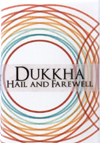Dukkha, "Hail And Release"
 Dukkha traffic in “true Sheffield black psychedelia” and appear to consist solely of an unnamed and enigmatic British guitarist. However, I am deeply skeptical of both his purity (the four tracks are stylistically varied) and his degree of evilness (Buddhist author Alan Watts is listed as his sole influence). He probably actually is from Sheffield though. Regardless, this is some intriguing (if somewhat flawed) stuff.
Dukkha traffic in “true Sheffield black psychedelia” and appear to consist solely of an unnamed and enigmatic British guitarist. However, I am deeply skeptical of both his purity (the four tracks are stylistically varied) and his degree of evilness (Buddhist author Alan Watts is listed as his sole influence). He probably actually is from Sheffield though. Regardless, this is some intriguing (if somewhat flawed) stuff.
Peasant Magik
Peasant Magik have provided a cryptic, evocative, and hyperbole-filled description for us: “Endless repetition. Keys spin over down-tuned sludge, FX-ridden guitars suffocate themselves, and utterly massive swells consume all laid before.” Notably, the only one of those descriptors that actually applies to all four songs is “endless repetition.”
The album opens with “Creswellian” (a British Paleolithic culture), built upon a vaguely medieval-sounding down-tuned doom riff that is very much in the Stephen O'Malley/Sunn o))) vein. As it repeats (endlessly, of course), a great deal of haunting, trebly, chattering weirdness is piled on. Unfortunately, Dukkha’s ambition and imagination are scuttled by his very limited production/recording budget. The main riff should be crushing, but ends up sounding like a muted bass hum and the “black psychedelia” occurring around it is buried too low in the mix to be fully appreciated.
The second track, “Hordron,” works much better. It is based upon a simple, melancholy and undistorted minor chord progression (with some deliberate “wrong” notes thrown in). The production still sucks, but the lack of distortion prevents it from turning completely into frustrating sonic mud. While it may seem like an oxymoron, this song features some beautiful, tasteful, and inventive wah-wah guitar work. (Hordron Edge is a stone circle near Sheffield, if you are curious. I am amused that all I can figure out about Dukkha is that he is a megalith enthusiast and probably a Buddhist.)
“The Finest Clothes Turn To Rags” kicks off side two with some discordant, high-end tremolo picking that sounds like someone just broke open a hive of evil, distorted hornets. This is the only moment of the album where I perceive a palpable Black Metal influence. Notably, it is this point on the album that “guitars suffocate themselves” and “consume all laid before” and the song implodes. Lamentably, the awesomeness of this moment is ruined yet again by sludginess- I am sure that this sounded like a goddamn supernova when it was actually being played. Most unfortunate.
“Chromes Gone Home” closes the album with some dark and eerie droning featuring the sounds of children playing buried in the mix. It is much more spacious than the rest of the album and features some nice impressionistic feedback near the end. There appears to be some underlying concept to this song that involves..um... trucks, which seems like an odd aberration next to the album's other arcane and ancient themes. Dukkha is certainly an inscrutable fellow.
Interestingly, “dukkha” is a Buddhist term that roughly translates as “disquiet” or “suffering.” The goal of Buddhism is (rather notably) the cessation of Dukkha. I hope this guy does not achieve enlightenment before recording an album that better does justice to his vision or before forging a sound that is more uniquely his own. (This cassette-only release is a limited edition of 100 copies)
Samples:



